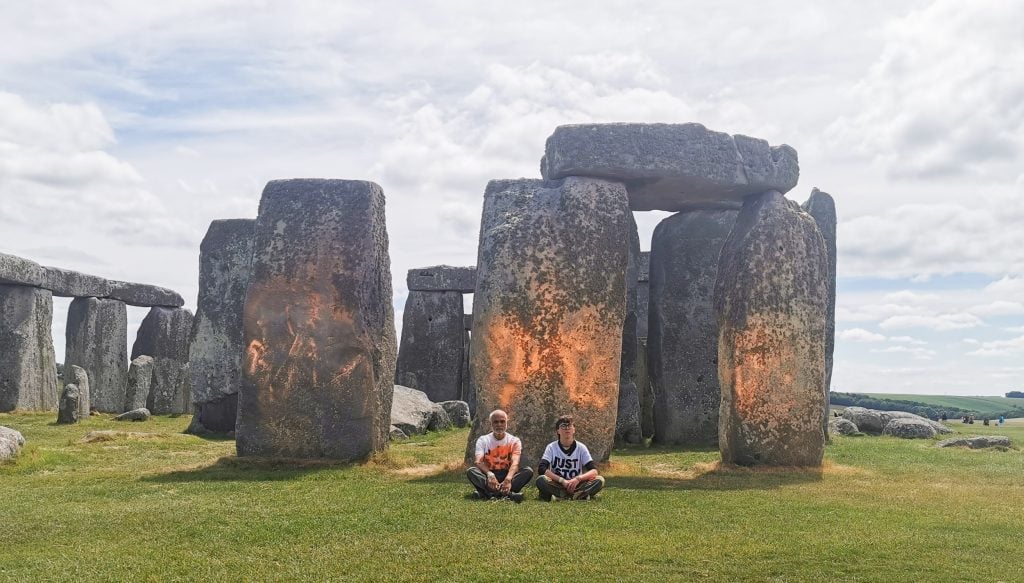Art World
Outrage After Protesters Spray Stonehenge Orange
The action roiled U.K. politicians although English Heritage confirms that there has been no visible damage to the monument.

The action roiled U.K. politicians although English Heritage confirms that there has been no visible damage to the monument.

Jo Lawson-Tancred

Stonehenge was sprayed with orange paint by climate protestors associated with Just Stop Oil yesterday, on the eve of the summer solstice. The activist group claimed that the paint was made from cornstarch and will wash off in the rain. Today, English Heritage’s chief executive Nick Merriman confirmed that “there appears to be no visible damage.”
Soon after the incident experts rushed to remove the orange powder for fear that it might harm the “important and rare” lichens growing on the stones. In a statement, English Heritage said, “the very act of removing the powder can, in itself, have a harmful impact by eroding the already fragile stone and damaging the lichens.”
The monument has remained open to the public and this evening’s summer solstice celebrations will go ahead as planned. The prehistoric stone circle is aligned towards the sunrise on the winter and summer solstice, and these occasions are still marked biannually by thousands who congregate at the site or tune in via livestream.
The protest was intended to draw attention to Just Stop Oil’s demand that the incoming government, which will be elected on July 4, signs a legally binding treaty to phase out fossil fuels by 2030.
The attack on the beloved prehistoric monument ignited a social media feud among British politicians in advance of the U.K. general election. Prime minister Rishi Sunak decried the “disgraceful act of vandalism” while his biggest opponent in the forthcoming election, Keir Starmer of the Labour party, also expressed disdain. “Just Stop Oil are pathetic,” he declared on X (formerly Twitter). “Those responsible must face the full force of the law.”
🚨 BREAKING: Just Stop Oil Spray Stonehenge Orange
🔥 2 people took action the day before Summer Solstice, demanding the incoming government sign up to a legally binding treaty to phase out fossil fuels by 2030.
🧯 Help us take megalithic action — https://t.co/R20S8YQD1j pic.twitter.com/ufzO8ZiDWu
— Just Stop Oil (@JustStop_Oil) June 19, 2024
Sunak also went so far as to suggest that a “certain Labour party donor” should comment, referring to green energy industrialist Dale Vince, who has previously backed Just Stop Oil. Taking to X, Vince responded: “I don’t support what JSO did today, it’s that simple. But there are far worse actions we could focus on, far more harmful ones—like pushing two million children and their families into poverty. This is what Sunak and the Conservatives have done with their two-child cap on benefits.”
Public opinion was also divided, but some suggested that ire toward the demonstrators might be misplaced. One online commentator warned, “I have bad news about something else that poses a risk to Stonehenge,” on X, citing a UN report from 2016 that said rising temperatures were likely to put the monument at risk. Some campaigners also believe that the ancient site is threatened by plans to build a road tunnel nearby.
The English comedian Sooz Kempner also weighed in on X, writing “if you’re cry-arsing about orange cornflower on Stonehenge you’re just gonna have to face the fact you’d be disgusted with the suffragettes. You won’t like this. But it’s true.”
“As an archaeologist and a supporter of Just Stop Oil, I think this action at Stonehenge was incredibly well done,” archaeologist Amelia Halls wrote on social media. “It’s cornstarch that will wash off in the rain, and its captured the attention of tens of thousands of people online. So much respect.”
Two activists for Just Stop Oil began spraying Stonehenge’s monolithic slabs with orange paint at around 12 p.m. BST on June 19. Almost immediately, onlookers began calling out for the pair to stop and two visitors tackled the protestors, in one case managing to retrieve the paint canister.
The activists have been identified as Oxford student Niamh Lynch, aged 21, and Rajan Naidu, who is 73 and from Birmingham. They were arrested on suspicion of criminal damage to an ancient monument, according to a statement by Wiltshire Police. They have since been released on bail while the police continue to “progress” their “enquiries.”
“We have to come together to defend humanity or we risk everything,” said a spokesperson for Just Stop Oil. “Supporters, along with citizens from Austria, Canada, Norway, the Netherlands and Switzerland will join in resistance this summer, if their own governments do not take meaningful action. Stone circles can be found in every part of Europe showing how we’ve always cooperated across vast distances—we’re building on that legacy.”
A UNESCO World Heritage Site since 1986, Stonehenge was constructed over many thousands years, most notably in the late Neolithic period. It has long stunned archaeologists for its sophistication.